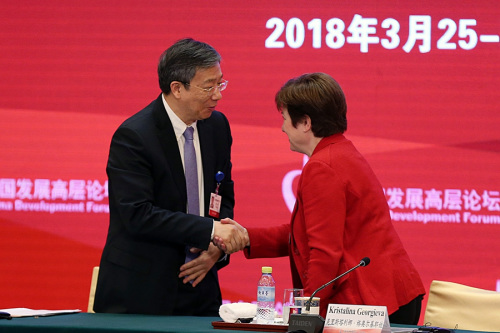 Yi Gang, newly elected governor of the People's Bank of China, greets Kristalina Georgieva, chief executive officer of the World Bank, at the China Development Forum 2018 in Beijing on Sunday. (Photo/CHINA DAILY) Yi also plans to speed up tax reform, bolster rules against financial risks China will work to accelerate financial opening-up, further taxation reform and continue strengthening regulations to reduce systemic risks and control the debt level, senior officials said on Sunday. Yi Gang, the newly elected governor of the People's Bank of China confirmed at the China Development Forum 2018 that the next step in facilitating opening-up of the financial sector, a series of reforming measures to ease market access for foreign investors will be launched in the future. As part of the service industry, the financial sector should allow market-oriented competition by using the existing national treatment system as well as a negative list mechanism, Yi said at the forum hosted by a think tank affiliated with the State Council, China's Cabinet. The whole opening-up process, as Yi described, needs to be in line with the ongoing foreign exchange rate reform and the process of capital account liberalization. "It doesn't mean the easing of financial regulation (for foreign companies)," Yi said. "Instead, there is no difference in the implementation of macro prudential regulations on domestic and foreign financial institutions, which all aim at systemic risk prevention." China is able to forestall financial risks stimulated by external shocks, such as the current Sino-U.S. trade and investment dispute, and any potential market fluctuations can be tamed, given the improved financial supervision system, said Yi, who just replaced former central bank governor Zhou Xiaochuan. Yi also stressed in his speech the importance of maintaining a prudent and neutral monetary policy, as well as stabilizing the whole financial sector, his key tasks for this year. At the forum, China's new Finance Minister Liu Kun, pledged to work on new taxation policies that could encourage Chinese enterprises' overseas direct investment while attracting more foreign direct investment to China, as an important part of the country's upgrade of the opening-up strategy. China has established and will continue to improve market-based economic development, which can be seen in the continuing GDP growth and improved living standard of residents, Liu said, responding to an allegation that China is retreating from a market-oriented economy. The two senior officials both highlighted the importance of further fending off potential financial risks in both local government and corporate debt, although the overall macro leveraging level has been under control since last year. Yi said that the final version of the much-discussed regulations on wealth management products, with coordinated efforts from different financial regulators, will be available soon, and more cross-area supervision will be put on financial holding groups. According to the National Institution for Finance and Development, China's macro leverage ratio went up by 2.5 percentage points in 2017, with an increase of 4.2 percentage points for the ratio in the household sector and a rise of 0.7 percentage points for the government leverage ratio, including local government leverage. The institution calculated China's national balance sheet data, which showed that by the end of 2017, China's sovereign assets totaled 241.4 trillion yuan ($35.8 trillion) and sovereign liabilities totaled 139.8 trillion yuan, resulting in net assets amounting to 101.6 trillion yuan. |